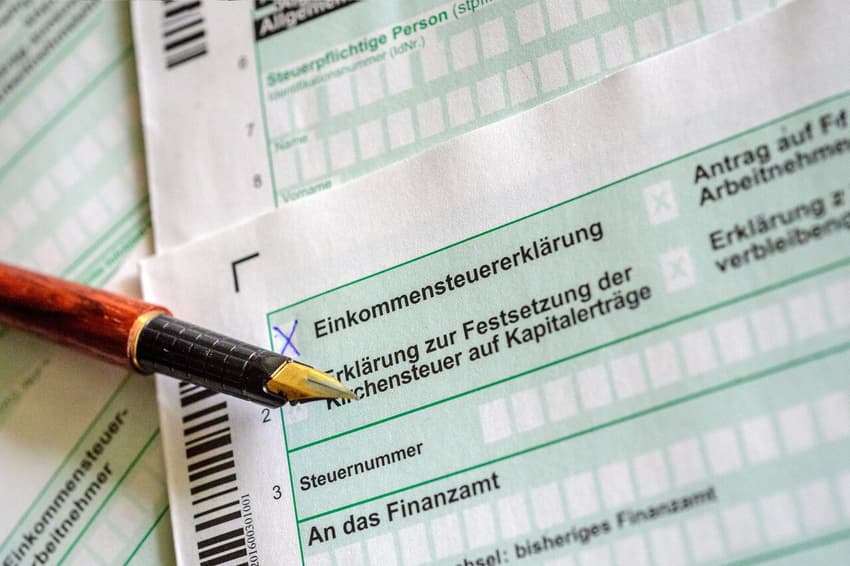What happens if you miss your tax return deadline in Germany?

The deadline for freelancers and some employees in Germany to submit their tax return fell on Monday. But what happens if you missed this deadline, or any others?
Germans are known for being punctual, and one of the places punctuality is taken most seriously is the Finanzamt (tax office). But what if you procrastinate - or inadvertently overlook a filing deadline - and submit your Steuererklärung (tax return) a bit too late? The consequences can vary quite a bit.
Do I even need to file a German tax return?
If you're an employee in Germany with no additional sources of income, you're not required to file taxes. But about 50 percent of employees do anyways, given that there's a slew of deductions you can make on everything from printing costs to commuting expenses.
That said, if you’re submitting voluntarily, you do have a little bit more leeway. You can hand over your return up to four years after the relevant tax year to still receive tax rebates - so for 2022, that would be December 31st, 2026.
However, if you have any extra sources of income, are self-employed, or have multiple jobs, you’re obligated to file by the Steuerfrist, or deadline.
READ ALSO: New deadlines and deductions: How to file taxes in Germany in 2023
When are the deadlines?
Anyone filing taxes through a Steuerberater (tax advisor) or tax association has longer to file their taxes.
For the tax year 2022, those filing on their own had until October 2nd, 2023 to file their taxes, whereas those with a tax advisor have until July 31st, 2024.
Germany recently set new deadlines, both for self-filers and those who file with tax advisors, through the year 2027.
READ ALSO: What you need to know about Germany’s extended tax filing deadlines
Can the deadline be extended?
If you can foresee that you will not be able to meet the deadline, you should request an extension from your responsible tax office, if possible in writing and with justification, before the deadline expires. An understandable valid reason would be, for example, an accident with hospital treatment, the death of a close relative, a longer stay abroad, missing documents or a move.
If you have usually been on time in the past, then you have a good chance of receiving an extension of up to four months. If you apply for only one additional month, you increase your chances that the tax office will be merciful.
In your letter to the tax office, you can write something along the lines of: “Falls ich von Ihnen nichts Gegenteiliges höre, gehe ich von der Genehmigung meines Antrags auf Fristverlängerung aus.“ ("Unless I hear from you to the contrary, I assume that my request for an extension of the deadline will be approved.")
If you have given a new deadline and the tax office does not respond, you can assume that they will grant your request.
However, there is no right to an extension of the deadline. If someone has already been late several times, experience shows that the tax office tends to reject the application.
What happens if I miss a deadline?
Simply letting the deadline pass and hoping that the tax office will forget you is not recommended. Still, the Finanzamt is usually fairly lenient at first, and sends a letter reminding you to submit your tax return.

ELSTER is the online portal for submitting tax returns in Germany. Photo: picture alliance/dpa/dpa-tmn | Christin Klose
But be warned: if there is a written Aufforderung zur Abgabe der Steuererklärung unter Androhung eines Zwangsgeldes ("request to submit the tax return under threat of a penalty payment"), things can quickly get serious.
READ ALSO: Reader question: How can I find a German tax advisor?
The tax office can already set a late payment surcharge (Verspätungszuschlag) that you have to pay in addition to your tax liability - and give you a new deadline. You can avoid at least one additional penalty, Zwangsgeld (fine), by filing a tax return before the new deadline expires.
If you also let this deadline pass, the tax office will inform you of the penalty payment in a notice. If this is the first time you haven't submitted a tax return, the fine could be around €25 per month or anywhere between €100 and €500. However, fines of up to €25,000 are possible.
The amount of the fine depends on various factors. Your financial situation plays a role, but also how cooperative you have been towards the authorities so far, or whether you have previously submitted your tax return.
Estimation as a last resort
If you still don't file a tax return, the tax office will estimate your taxable income. While this estimate is usually to your disadvantage, you are still obliged to pay. You have one month after the appraisal notice (Schätzungsbescheid) to appeal. After that it becomes final.
READ ALSO: Reader question: How can I find a German tax advisor?
If you pay your taxes too late, the tax office can also demand a late payment surcharge (Säumniszuschlag). Interest may also accrue on tax arrears (Steuernachzahlungen). This normally begins after a waiting period of 15 months after the end of the calendar year in which the tax arose.
The statutory interest (gesetzlichen Zinsen) is 0.15 percent for each month, i.e. 1.8 percent for one year. For many years, the interest rate was even six percent per year, but this was lowered in a decision from the Federal Constitutional Court of 2021.
Taxpayers in arrears can face significant sums in addition to the tax arrears, none of which is deductible from future income tax.
Comments (1)
See Also
Germans are known for being punctual, and one of the places punctuality is taken most seriously is the Finanzamt (tax office). But what if you procrastinate - or inadvertently overlook a filing deadline - and submit your Steuererklärung (tax return) a bit too late? The consequences can vary quite a bit.
Do I even need to file a German tax return?
If you're an employee in Germany with no additional sources of income, you're not required to file taxes. But about 50 percent of employees do anyways, given that there's a slew of deductions you can make on everything from printing costs to commuting expenses.
That said, if you’re submitting voluntarily, you do have a little bit more leeway. You can hand over your return up to four years after the relevant tax year to still receive tax rebates - so for 2022, that would be December 31st, 2026.
However, if you have any extra sources of income, are self-employed, or have multiple jobs, you’re obligated to file by the Steuerfrist, or deadline.
READ ALSO: New deadlines and deductions: How to file taxes in Germany in 2023
When are the deadlines?
Anyone filing taxes through a Steuerberater (tax advisor) or tax association has longer to file their taxes.
For the tax year 2022, those filing on their own had until October 2nd, 2023 to file their taxes, whereas those with a tax advisor have until July 31st, 2024.
Germany recently set new deadlines, both for self-filers and those who file with tax advisors, through the year 2027.
READ ALSO: What you need to know about Germany’s extended tax filing deadlines
Can the deadline be extended?
If you can foresee that you will not be able to meet the deadline, you should request an extension from your responsible tax office, if possible in writing and with justification, before the deadline expires. An understandable valid reason would be, for example, an accident with hospital treatment, the death of a close relative, a longer stay abroad, missing documents or a move.
If you have usually been on time in the past, then you have a good chance of receiving an extension of up to four months. If you apply for only one additional month, you increase your chances that the tax office will be merciful.
In your letter to the tax office, you can write something along the lines of: “Falls ich von Ihnen nichts Gegenteiliges höre, gehe ich von der Genehmigung meines Antrags auf Fristverlängerung aus.“ ("Unless I hear from you to the contrary, I assume that my request for an extension of the deadline will be approved.")
If you have given a new deadline and the tax office does not respond, you can assume that they will grant your request.
However, there is no right to an extension of the deadline. If someone has already been late several times, experience shows that the tax office tends to reject the application.
What happens if I miss a deadline?
Simply letting the deadline pass and hoping that the tax office will forget you is not recommended. Still, the Finanzamt is usually fairly lenient at first, and sends a letter reminding you to submit your tax return.

But be warned: if there is a written Aufforderung zur Abgabe der Steuererklärung unter Androhung eines Zwangsgeldes ("request to submit the tax return under threat of a penalty payment"), things can quickly get serious.
READ ALSO: Reader question: How can I find a German tax advisor?
The tax office can already set a late payment surcharge (Verspätungszuschlag) that you have to pay in addition to your tax liability - and give you a new deadline. You can avoid at least one additional penalty, Zwangsgeld (fine), by filing a tax return before the new deadline expires.
If you also let this deadline pass, the tax office will inform you of the penalty payment in a notice. If this is the first time you haven't submitted a tax return, the fine could be around €25 per month or anywhere between €100 and €500. However, fines of up to €25,000 are possible.
The amount of the fine depends on various factors. Your financial situation plays a role, but also how cooperative you have been towards the authorities so far, or whether you have previously submitted your tax return.
Estimation as a last resort
If you still don't file a tax return, the tax office will estimate your taxable income. While this estimate is usually to your disadvantage, you are still obliged to pay. You have one month after the appraisal notice (Schätzungsbescheid) to appeal. After that it becomes final.
READ ALSO: Reader question: How can I find a German tax advisor?
If you pay your taxes too late, the tax office can also demand a late payment surcharge (Säumniszuschlag). Interest may also accrue on tax arrears (Steuernachzahlungen). This normally begins after a waiting period of 15 months after the end of the calendar year in which the tax arose.
The statutory interest (gesetzlichen Zinsen) is 0.15 percent for each month, i.e. 1.8 percent for one year. For many years, the interest rate was even six percent per year, but this was lowered in a decision from the Federal Constitutional Court of 2021.
Taxpayers in arrears can face significant sums in addition to the tax arrears, none of which is deductible from future income tax.
Join the conversation in our comments section below. Share your own views and experience and if you have a question or suggestion for our journalists then email us at [email protected].
Please keep comments civil, constructive and on topic – and make sure to read our terms of use before getting involved.
Please log in here to leave a comment.